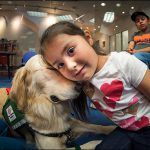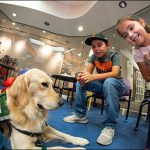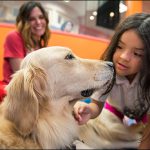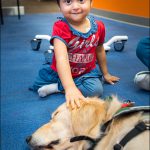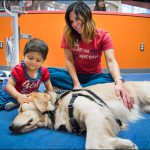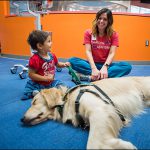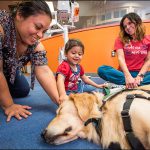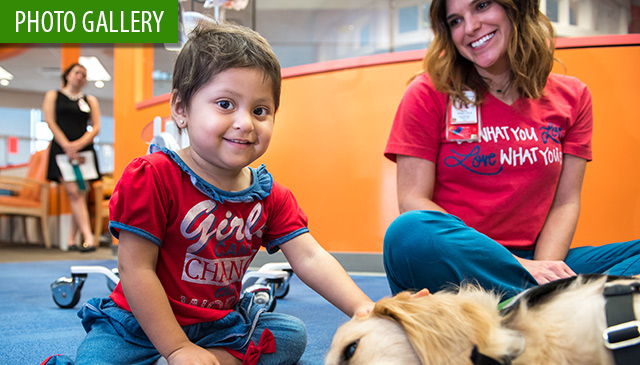 On July 9 the Cancer Center clinic surprised outpatients with a visit from Elsa, one of Texas Children’s three therapy dogs.
On July 9 the Cancer Center clinic surprised outpatients with a visit from Elsa, one of Texas Children’s three therapy dogs.
With the dogs constantly making their rounds throughout the hospital visiting inpatients, at times outpatients miss the opportunity to see their furry friends.
“Elsa and I spent a lot of time with the hematology oncology inpatient population during our first year and a half,” said Animal Assisted Therapy Coordinator, Sarah Herbek. “Our patients began to look forward to coming to the hospital and seeing Elsa during their admission. Their journey doesn’t end when they are discharged, and neither should their relationship with Elsa.”
As Elsa’s handler it was Herbek’s goal, along with other members of the Child Life department to provide continuity of care by following these patients throughout their entire treatment journey, inpatient and outpatient.
“I think Elsa and our Pawsitive Play Program have been especially impactful with our cancer patients because of the long duration of their treatment,” Herbek said. “Our patients come to Texas Children’s on a regular basis for months and sometimes years. Elsa’s presence is something they are able to look forward to during those times. They know that Elsa will be there when they need a shoulder to cry on, a paw to hold, or a furry friend to snuggle with.”
The hospital launched its Pawsitive Play Program in 2016 and it has become highly appreciated throughout the organization in just that small amount of time. The goal of the committee that introduced this program was to use animal-assisted therapy to enhance the emotional well-being of pediatric patients by reducing their anxiety, perception of pain and fear of hospitalization.
“As Executive Vice-Chair, I represented the Department of Pediatrics on Texas Children’s Hospital Facility Dog Steering Committee,” said Dr. Susan Blaney, director of Texas Children’s Cancer and Hematology Centers. “This committee is actively exploring multiple opportunities for children and their families to benefit from therapy dogs.”
Cancer treatment can be very painful physically and mentally. Adding a trained therapy dog to this stressful environment can increase a patient’s energy level and decrease any discomfort or anxiety.
Also, a lot of the patients in the clinic have severe conditions and are not able to experience situations that other children their age would. For one patient the visit from Elsa fulfilled this void with it being her first time interacting with a dog.
“It is very important for patients receiving treatment in the Cancer Center to be able to have time with Elsa because it is a meaningful interaction during a difficult time,” said Child Life Specialist, Katy O’Dell. “These interactions can boost the patients overall mood by allowing them to engage in activities with Elsa that are fun and interactive, which most importantly brings a smile to their face.”
Now that the Pawsitive Play program has grown and added both Bailey, the Legacy Tower therapy dog, and Pinto in Acute care, it has become even more impactful.
“The positive psychosocial impact of the therapy dogs is better than that of any medicine that we could prescribe,” said Blaney. “We are so thankful that Texas Children’s supports the therapy dog program and that we have world class child life specialists who work with this program to handle the dogs as well as to provide support to the children and their families.”


